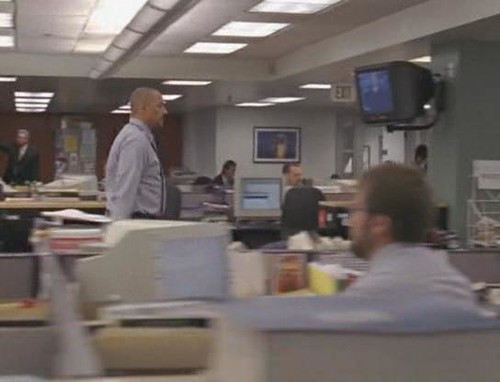For example, here are all the actors explaining with whom they wish they had played a scene:
I hope everyone is re-enjoying the show as much as I am.
"It's all in the game"
Although racism is endemic to neoliberal governmentality, The Wire recognises that anti-racism is hegemonic now. This is no mere superstructural or ideological rhetoric, but present, if unevenly, in the discourses and practices of institutions and society more generally. If in the analysis of race we examine the representations of the black characters in the series we get very quickly get caught in an undecidable bind: arguably the series shows a diverse and complex range of African-American characters, yet the depictions are reducible racial stereotypes (positive or negative). The limitations with an analysis of the politics of representation is that it remains confined to a struggle over media representation. In this approach, television series are analysed as texts that are politically interpreted in isolation of the matrix of social affect, information and desire. ‘Realism’ and ‘authenticity’ become the only sites for debates over racial meaning and power. The affective dimension of race in the circuits of knowledge and information across the series and audiences; for instance, in the grain of the voices of the Baltimore accents or in the coded communication of the street corners, need analysis.Ash's work is some pretty heavy lifting for those not versed in cultural studies and the jargon of that tribe, but it's well worth the effort. I appreciated his attempts to move beyond a duality where The Wire is either a racist appropriation of urban black life featuring modern minstrelsy or it's an authentic view of West Baltimore life, told to a part of America that never sets foot there. Instead, as Ash argues, race is located "within the structures of the series" to "understand the racial logics of neoliberalism and contemporary institutions of power and control." His essay and others in the journal constantly ask (after Sudhir Venkatesh's Freakonomics interviews with 'Real Thugs'): "If the gangs were white, what would be different about the show?"
 From President Barack Obama to Eminem (H/T)and Filmakers/political pundits/white people?, everybody loves The Wire. Eminem even includes Dominic West (McNulty) on his newest album which was somehow recorded in between watching the entire series' run FOUR times.
From President Barack Obama to Eminem (H/T)and Filmakers/political pundits/white people?, everybody loves The Wire. Eminem even includes Dominic West (McNulty) on his newest album which was somehow recorded in between watching the entire series' run FOUR times.  The NYTimes describes a real life defense attorney for the bad guys who gets pinned for murda one. Like Maurice Levy, played by Michael Kostroff, Paul Bergrin was a successful attorney, "hobnobbing with celebrities." The nut grafe:
The NYTimes describes a real life defense attorney for the bad guys who gets pinned for murda one. Like Maurice Levy, played by Michael Kostroff, Paul Bergrin was a successful attorney, "hobnobbing with celebrities." The nut grafe:According to court records, the conversation captured him telling his client’s cousin, one of Newark’s most powerful drug lords, the identity of a confidential witness: Deshawn McCray, known as Kemo. A few days later, the authorities say, Mr. Bergrin met with his client’s cousin again and told him “No Kemo, no case.”
Mr. McCray was shot to death three months later in a brutal ambush, forcing prosecutors to drop the charges against Mr. Bergrin’s client, William Baskerville.

 Via Unfogged, NYTimes Modern Love does The Wire. I guess it's a pretty good show on which to meditate about Life and Death; Love and War... I can also conclude that there are some bigger fans of the show than I am as I probably wouldn't choose to watch episodes of The Wire on my deathbed.
Via Unfogged, NYTimes Modern Love does The Wire. I guess it's a pretty good show on which to meditate about Life and Death; Love and War... I can also conclude that there are some bigger fans of the show than I am as I probably wouldn't choose to watch episodes of The Wire on my deathbed.